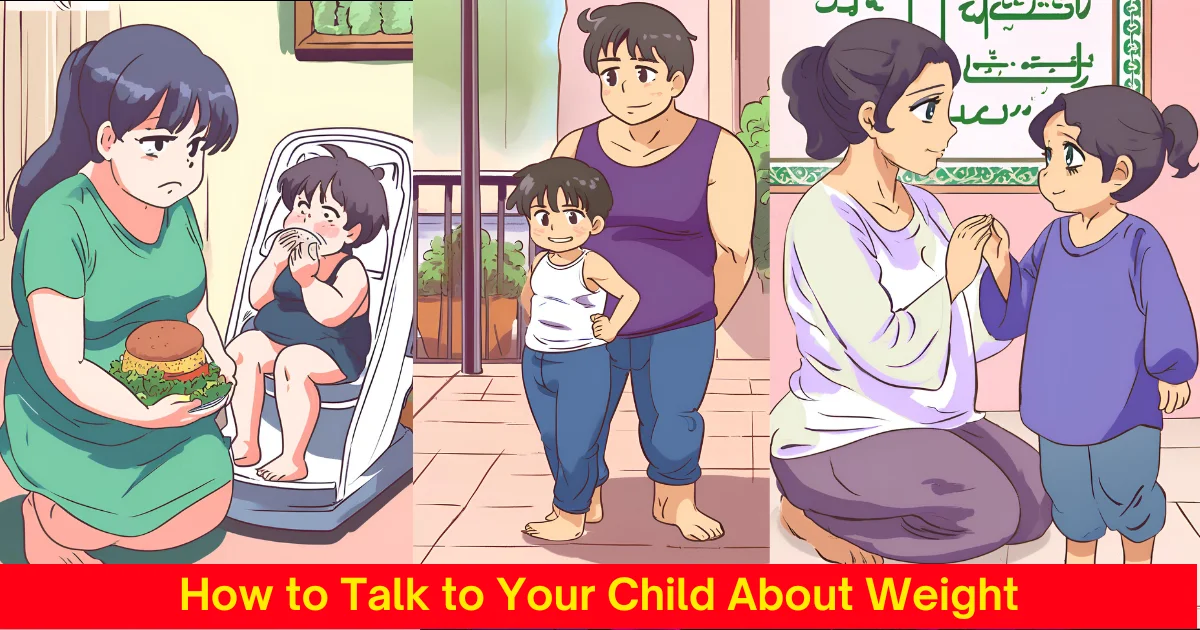Discussing weight with children requires care and sensitivity. This guide offers tips on initiating open conversations, focusing on health over appearance, involving your child, and seeking professional help if needed – all while promoting positive body image.
Introduction
Discussing weight with our children can be a delicate and challenging topic for parents. It requires sensitivity, empathy, and a deep understanding of the complex emotions and issues surrounding weight and body image. At Digital News Planet, we understand the importance of this crucial dialogue and aim to provide you with a comprehensive guide on how to talk to your child about weight in a respectful and supportive manner.
Read More: Navigating Weight Loss Insurance Coverage
How to Talk to Your Child About Weight Gain PDF: A Sensitive and Supportive Approach
The Importance of Addressing Weight Concerns
While weight is a sensitive subject, it’s crucial to address any concerns about your child’s weight in a timely and appropriate manner. Childhood obesity has become a significant public health issue, with potential long-term consequences such as increased risk of chronic diseases, low self-esteem, and mental health challenges.
However, it’s important to approach this discussion with care and avoid stigmatizing or shaming language that could potentially exacerbate the issue or lead to disordered eating behaviors.
Creating a Safe and Supportive Environment

Before initiating a conversation about weight, it’s essential to create a safe and supportive environment for your child. Choose a private and comfortable setting where your child feels at ease and reassured that you’re approaching the topic from a place of love and concern for their overall well-being.
Remind your child that your love and acceptance are unconditional and that this discussion is not about criticizing their appearance but rather about promoting a healthy lifestyle that will benefit them in the long run.
Focusing on Health, Not Appearance
When discussing weight with your child, it’s crucial to shift the focus away from appearance and toward overall health. Instead of using terms like “overweight” or “obese,” which can be stigmatizing, frame the conversation around establishing healthy habits and promoting physical and mental well-being.
Emphasize the importance of a balanced diet, regular physical activity, and self-care practices that can contribute to their overall health and happiness.
Involving Your Child in the Process
Rather than dictating changes or imposing strict rules, involve your child in the process of developing a healthy lifestyle plan. Please encourage them to share their thoughts, concerns, and preferences regarding food choices, physical activities, and any other relevant factors.
By actively listening and considering their input, you can create a collaborative approach that empowers your child to take ownership of their health journey.
Addressing Potential Underlying Issues
In some cases, weight concerns may stem from underlying emotional or psychological issues, such as stress, anxiety, or low self-esteem. It’s essential to be attuned to these potential factors and address them with sensitivity and compassion.
If you suspect that your child may be struggling with mental health challenges or disordered eating behaviors, seek professional support from a qualified healthcare provider or counselor.
Promoting a Positive Body Image
In addition to discussing weight and health, it’s crucial to promote a positive body image and self-acceptance in your child. Please encourage them to appreciate their unique qualities and strengths beyond physical appearance and remind them that true beauty comes from within.
Celebrate their accomplishments, talents, and positive character traits, and discourage any negative self-talk or body shaming.
Leading by Example
As parents, it’s essential to lead by example when it comes to promoting healthy habits and a positive body image. Model healthy eating patterns, engage in regular physical activity as a family, and avoid making negative comments about your own or others’ bodies.
Children often learn from observing their parents’ behaviors and attitudes. Hence, it’s important to demonstrate a balanced and accepting approach to body size and shape.
Seeking Professional Support
In some cases, addressing weight concerns may require the expertise of healthcare professionals, such as pediatricians, nutritionists, or mental health counselors. If you feel overwhelmed or unsure about how to navigate this sensitive topic effectively, feel free to seek professional support.
These professionals can provide valuable guidance, resources, and personalized strategies to ensure your child’s physical and emotional well-being throughout their weight management journey.
Celebrating Progress and Positive Changes
Throughout the process of addressing weight concerns, it’s important to celebrate small victories and positive changes. Acknowledge and praise your child’s efforts in adopting healthier habits, regardless of the immediate results on the scale.
Focusing on non-scale victories, such as increased energy levels, improved mood, or enhanced self-confidence, can reinforce the benefits of a healthy lifestyle and motivate your child to continue on their journey.
Addressing Specific Situations and Concerns

While the general principles of discussing weight with your child remain consistent, there may be specific situations or concerns that require additional guidance and consideration.
How to Talk to Your Child About Weight Gain
If you’ve noticed weight gain in your child, approach the topic with sensitivity and avoid making assumptions about the underlying causes. Gently express your concern for their overall health and well-being and offer to work together to explore potential contributing factors, such as changes in diet, activity levels, or emotional stressors.
Remember to focus on promoting healthy habits rather than emphasizing the weight gain itself, as this can potentially contribute to negative body image or disordered eating behaviors.
How to Talk to Your Grown Daughter About Her Weight
Discussing weight with an adult daughter can be particularly challenging, as they may have already developed their perspectives and attitudes towards their body and weight. Approach the conversation with respect and avoid making judgmental or critical comments.
Express your concerns from a place of love and care for her well-being, and offer to support her in exploring healthy lifestyle choices if she is open to it. However, it’s essential to respect her autonomy and avoid attempting to impose your views or expectations.
What Not to Say to an Overweight Child
While discussing weight with your child, it’s crucial to be mindful of the language and tone you use. Avoid making comments that could be perceived as shaming, critical, or stigmatizing, such as:
- “You’ve really let yourself go.”
- “You need to lose weight and slim down.”
- “No one will find you attractive unless you lose weight.”
- “You’re just lazy and need to exercise more.”
These types of statements can be incredibly damaging to a child’s self-esteem. They can potentially contribute to disordered eating behaviors or other mental health challenges.
My Daughter Is Gaining Weight Rapidly
Suppose you’ve noticed a rapid or significant weight gain in your daughter. In that case, it’s important to approach the situation with care and compassion. Avoid making assumptions or accusations, and instead, express your concern for her overall health and well-being.
Encourage an open dialogue to explore potential contributing factors, such as changes in diet, physical activity levels, stress levels, or any underlying medical conditions. Offer your support in seeking professional guidance from a healthcare provider if necessary.
How to Tell Your Daughter She Needs to Lose Weight
If you feel that your daughter’s weight has reached a point where it may be impacting her health, approach the conversation with sensitivity and avoid using language that could be perceived as judgmental or critical.
Instead, focus on expressing your concern for her well-being and offering to support her in adopting healthier habits, such as making nutritious food choices and engaging in regular physical activity.
Emphasize that your love and acceptance are unconditional and that any changes should be pursued for the sake of her overall health and happiness, not solely for weight loss.
My Child Is Overweight and Always Hungry

Suppose your child is overweight and constantly feels hungry. In that case, it’s important to explore potential underlying causes rather than simply restricting their food intake. Factors such as nutritional deficiencies, hormonal imbalances, or emotional eating patterns could be contributing to their persistent hunger.
Work with a healthcare professional or registered dietitian to assess your child’s dietary needs and develop a balanced meal plan that incorporates nutrient-dense foods that promote satiety. Additionally, address any emotional or psychological factors that may be driving their overeating tendencies.
How to Talk About Weight with Your Partner
Discussing weight can also be a sensitive topic in intimate relationships. When approaching this conversation with your partner, it’s crucial to show empathy, respect, and a nonjudgmental attitude.
Express your concerns from a place of care and support, focusing on promoting overall health and well-being rather than solely emphasizing physical appearance. Avoid making critical comments or ultimatums, and instead, offer to explore healthy lifestyle changes together as a team.
Remember that weight and body image can be deeply personal and emotional issues, so be prepared to listen actively, validate your partner’s feelings, and seek professional guidance if necessary.
My 21-Year-Old Daughter Is Overweight.
Addressing weight concerns with an adult child can be particularly delicate, as they may have already developed their perspectives and beliefs surrounding their body and weight. Approach the conversation with respect and avoid making judgmental or critical comments.
Express your concerns from a place of love and care for her well-being, and offer to support her in exploring healthy lifestyle choices if she is open to it. However, it’s essential to respect her autonomy and avoid attempting to impose your views or expectations.
Seeking Professional Help
In certain cases, seeking professional help may be necessary when addressing weight-related concerns with your child. It’s essential to recognize when the situation requires the expertise and guidance of healthcare professionals or mental health experts.
Involving a Pediatrician or Nutritionist
Suppose you’re concerned about your child’s weight or eating habits. In that case, it’s advisable to consult with a pediatrician or a registered dietitian. These professionals can provide valuable insights, conduct assessments, and develop personalized plans tailored to your child’s specific needs and goals.
A pediatrician can rule out any underlying medical conditions that may be contributing to weight gain or loss. At the same time, a nutritionist can create a balanced meal plan and guide healthy eating habits.
Seeking Counseling or Therapy
In some cases, weight-related issues may be linked to emotional or psychological factors, such as low self-esteem, body image concerns, or disordered eating behaviors. In these situations, seeking counseling or therapy from a qualified mental health professional can be incredibly beneficial.
A therapist or counselor can help your child explore and address the underlying emotional drivers of their weight struggles, develop coping strategies, and work towards a healthier relationship with food and their body.
Addressing Bullying or Stigma
Unfortunately, children who are overweight or obese may face bullying, stigma, or discrimination from their peers or even adults. These experiences can have profound negative impacts on their mental health and overall well-being.
Suppose your child is experiencing bullying or stigma related to their weight. In that case, it’s crucial to address the issue promptly and seek support from school authorities, counselors, or other relevant professionals. Provide your child with coping strategies and resources to build resilience and self-confidence.
Encouraging a Healthy Lifestyle as a Family
One of the most effective ways to support your child’s journey towards a healthier weight is by embracing a family-wide approach to healthy living. This not only helps create a supportive and inclusive environment but also reinforces the importance of making sustainable lifestyle changes together.
Involving the Whole Family
Involve the entire family in the process of adopting healthier habits. Make meal planning and preparation a collaborative effort, encouraging input from all family members and incorporating their favorite nutritious foods.
Engage in physical activities together, such as family walks, bike rides, or outdoor adventures, making exercise a fun and bonding experience.
Leading by Example
As parents, it’s crucial to lead by example when it comes to embracing a healthy lifestyle. Model positive behaviors, such as mindful eating, portion control, and regular physical activity.
Avoid making negative comments about your own body or weight, as this can reinforce unhealthy attitudes and contribute to body image issues within the family.
Celebrating Non-Weight-Related Achievements

While working towards a healthier weight is commendable, it’s important to celebrate your child’s achievements and successes that go beyond the scale. Acknowledge and praise their efforts in adopting healthier habits, improved self-confidence, academic accomplishments, or achievements in extracurricular activities.
This reinforces the idea that their worth and value extend far beyond their physical appearance and help build a positive self-image.
Creating a Supportive Home Environment
The home environment plays a crucial role in fostering healthy habits and positive attitudes toward weight and body image. Take steps to create a supportive and nurturing environment that promotes overall well-being.
Encouraging Open Communication
Encourage open and honest communication within the family about weight-related topics, emotions, and experiences. Create a safe space where your child feels comfortable expressing their feelings, concerns, or struggles without fear of judgment or criticism.
Promoting Body Positivity and Self-Acceptance
Foster an environment that celebrates body diversity and promotes self-acceptance. Discourage negative self-talk or body shaming, and instead, reinforce the idea that beauty comes in all shapes and sizes.
Please encourage your child to appreciate their unique qualities and strengths beyond physical appearance and remind them that their worth is not tied to their weight or body size.
Limiting Media Influence
Be mindful of the media and societal influences that can perpetuate unrealistic beauty standards and contribute to body image issues. Limit exposure to media that promotes unhealthy or unrealistic body ideals and engage in open discussions about the harmful impact of such messaging.
Instead, seek out and promote positive representations of diverse body types and celebrate individuals who are celebrated for their talents, achievements, and character rather than solely their appearance.
Seeking Support from Others
In addition to professional help and creating a supportive home environment, it can be beneficial to seek support from others who are navigating similar experiences or challenges related to weight and body image.
Finding Support Groups or Online Communities
Consider joining support groups or online communities specifically designed for parents and families dealing with weight-related concerns. These platforms can provide a safe space to share experiences, seek advice, and gain valuable insights from others who understand the unique challenges you and your child may be facing.
Building a Network of Understanding Friends and Family
Surround yourself and your child with a network of understanding friends and family members who can offer emotional support and encouragement throughout your journey. Educate them on the sensitive nature of weight-related discussions and enlist their assistance in creating a positive and accepting environment for your child.
Advocating for Inclusive and Supportive Environments
Beyond the home and personal circles, it’s important to advocate for inclusive and supportive environments in schools, healthcare facilities, and other public spaces. Work with educators, healthcare providers, and community leaders to raise awareness about the importance of addressing weight-related issues with sensitivity and promoting body positivity.
Encourage the implementation of anti-bullying policies, inclusive programming, and educational resources that foster understanding and acceptance of diverse body types.
Conclusion
Discussing weight with your child can be a complex and emotionally charged conversation. Still, it should be approached with sensitivity, empathy, and a deep understanding of the underlying issues. By creating a supportive environment, focusing on overall health and well-being, involving your child in the process, and seeking professional help when needed, you can navigate this delicate topic in a way that promotes positive body image, self-acceptance, and sustainable lifestyle changes.
Remember, the journey towards a healthier weight is not just about physical transformation but also about fostering a positive mindset, developing healthy habits, and cultivating a deep sense of self-worth and confidence in your child.
At Digital News Planet, we remain committed to providing you with valuable insights and resources that empower you to have meaningful and impactful conversations with your children, ultimately supporting their overall well-being and personal growth.
FAQs on Talking to Your Child About Weight
Q1: How can I initiate a conversation about weight with my child without making them feel self-conscious or ashamed?A: The key is to approach the topic with sensitivity and avoid language that could be perceived as judgmental or critical. Instead of focusing on weight or appearance, frame the conversation around promoting overall health and well-being. Express your concern from a place of love and care, and involve your child in the process of developing healthy habits.
Q2: What if my child becomes defensive or resistant when I try to discuss their weight? A: It’s important to acknowledge that discussing weight can be a sensitive and emotional topic for children. If your child becomes defensive or resistant, avoid escalating the situation. Instead, take a step back, validate their feelings, and reassure them that your intentions come from a place of love and concern for their well-being. Be patient and open to revisiting the conversation when they are more receptive.
Q3: How can I encourage healthy habits without making my child feel like they’re on a strict diet? A: Instead of focusing on dieting or weight loss, emphasize the importance of adopting a balanced and nutritious lifestyle as a family. Involve your child in meal planning and preparation, and make healthy choices together. Encourage physical activity by finding enjoyable activities that the whole family can participate in, such as sports, hiking, or dancing.
Q4: What if my child is struggling with body image issues or disordered eating behaviors? A: If you suspect that your child is experiencing body image issues or disordered eating behaviors, it’s crucial to seek professional help from a qualified mental health professional or eating disorder specialist. These experts can provide guidance and support to address the underlying emotional and psychological factors contributing to the issue.
Q5: How can I support my child if they are facing bullying or stigma related to their weight? A: Bullying and stigma can have profound negative impacts on a child’s mental health and well-being. If your child is experiencing bullying or stigma related to their weight, address the issue promptly by involving school authorities, counselors, or relevant professionals. Provide your child with coping strategies and resources to build resilience and self-confidence, and advocate for inclusive and supportive environments.
Q6: What role can extended family members or friends play in supporting a child’s healthy weight journey?
A: Extended family members and friends can play a significant role in creating a supportive and understanding environment for your child. Educate them on the sensitive nature of weight-related discussions and enlist their assistance in promoting body positivity and healthy lifestyle choices. Please encourage them to avoid making negative comments or assumptions about your child’s weight or appearance and instead focus on celebrating their strengths, talents, and achievements beyond physical characteristics.
Q7: How can I address weight concerns with my child without making them feel like they’re being singled out?A: To avoid making your child feel singled out, consider adopting a family-wide approach to healthy living. Involve the entire family in the process of making nutritious food choices, engaging in physical activities together, and fostering an environment that celebrates overall well-being. This inclusive approach can help normalize the pursuit of a healthier lifestyle without targeting any specific individual.
Q8: What are some effective strategies for promoting positive body image and self-acceptance in children? A: Promoting positive body image and self-acceptance in children is crucial for their overall well-being. Some effective strategies include:
- Celebrating your child’s unique qualities, talents, and accomplishments beyond physical appearance.
- Modeling healthy self-talk and avoiding negative comments about your own or others’ bodies.
- Limiting exposure to media that perpetuates unrealistic beauty standards and promoting diverse representations of body types.
- Encouraging self-care practices that foster self-love and confidence, such as positive affirmations or mindfulness exercises.
Q9: How can I navigate cultural or societal pressures that may influence my child’s perception of weight and body image? A: Cultural and societal pressures can significantly impact a child’s perception of weight and body image. To navigate these influences, it’s essential to have open and honest conversations with your child about the harmful effects of unrealistic beauty standards and the importance of embracing diversity. Encourage critical thinking and media literacy to help your child develop a more inclusive and informed perspective. Additionally, seek out and celebrate positive representations of diverse body types within your cultural community or media sources.
Q10: What are some age-appropriate ways to discuss weight and healthy habits with children at different developmental stages?A: The approach to discussing weight and healthy habits should be tailored to your child’s age and developmental stage. For younger children, focus on promoting healthy habits through fun and engaging activities, such as cooking together or playing active games. Use simple language and avoid mentioning weight or appearance directly.

